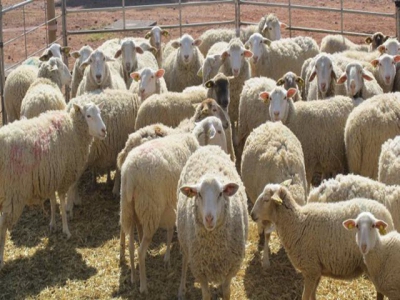New reproductive protocol for sheep uses natural hormones

New system also decreases the time during which sheep are exposed to exogenous reproductive hormones.
Researchers of the Veterinary Faculty of the CEU Cardenal Herrera University (CEU UCH) in Valencia, Spain, and Spain's National Institute of Farming & Food Research & Technology (INIA) have designed a new protocol to improve the sheep reproduction by synchronizing heats and ovulation periods based on the use of natural hormones.
According to the announcement, this new system also decreases the time during which sheep are exposed to progestogens during the hormonal protocols and adds a new intravaginal device — a controlled internal drug release (CIDR) device — with natural progesterone, which decreases the risk of infections.
Therefore, it is a new reproductive methodology that favors the well-being of the animals and, at the same time, the health of consumers, by minimizing the pharmacological residue that is present in the products derived from sheep.
The development of this protocol without artificial hormones was headed by researchers Paula Martínez Ros, professor of the department of animal production and health of the Veterinary Faculty and head of the teaching farm and veterinary research unit at CEU UCH, and INIA scientific researcher Antonio González de Bulnes.
Without synthetic hormones
As Ros explained, “The growing demand for food free from pharmacological residues has also increased the number of countries that require their livestock breeders, and also importers and exporters, to respect sustainable reproductive practices, without using synthetic hormones. As a result, the use of progestogens to synchronize heat is currently being analyzed. In the case of the European Union, the use of synthetic steroid hormones is being reviewed, due to generating residues in animal carcasses. Breeders, therefore, need alternatives that minimize or completely avoid the use of synthetic hormonal treatments, such as the protocol developed by CEU UCH and INIA that uses CIDR devices.”
The induction and synchronization of heat in the case of small ruminants is often done with treatments based on exogenous hormones. Progesterone, or equivalent substances, are the most commonly used hormones for the estrus synchronization of sheep. These hormones are applied through intravaginal devices during a two-week period, as they must surpass the average lifespan of a potential corpus luteum in the ovary.
The new protocol prevents the use of synthetic hormonal treatments by using natural progesterone, thus reducing potential risks for human health caused by residues present in products of animal origin. At the same time, it improves animal well-being, as it cuts the time the CIDR must remain inserted by half, while also reducing the risk of infection by being manufactured with inert silicone.
Ros said, “This advance is of great importance for the sheep sector, as any improvement in reproductive efficiency is key for the global efficiency of sheep farms. The increase in fertility and prolificacy of the flocks more than just in springtime, makes it possible to supply the market demand for the whole year, overcoming the seasonal limitation of the product offer and increasing its economic value. Those breeders who are able to put products that are 'out of season' on the market benefit from higher prices during the winter, thus increasing the profitability of their sheep production.”
The design and results obtained with this method have been published in three scientific articles in international journals, two in Animals and one in Reproduction in Domestic Animals. The design of short protocols had already been published before in Animal Reproduction Science. Together with Ros, CEU UCH professors Mari Carmen López Mendoza, Marta Lozano, Alejandro Ríos and Empar García Roselló have also taken part in the research, as well as INIA researcher Susana Astiz.
Có thể bạn quan tâm
 Sheep with higher vitamin D levels give birth to heavier lambs
Sheep with higher vitamin D levels give birth to heavier lambs Researchers explore link between vitamin D levels and health and reproductive outcomes in sheep.
 Lawley’s to boost efficiency, footprint with new feed additive production site
Lawley’s to boost efficiency, footprint with new feed additive production site Lawley’s Inc. is seeking to improve its support of dairy producers, along with its production efficiency and quality control with a new Texas-based
 Big data could help improve livestock resilience
Big data could help improve livestock resilience Automation in livestock farming so far has been limited to dairy cows and pigs, but new developments expected for laying hens, broilers, meat cows and fish.